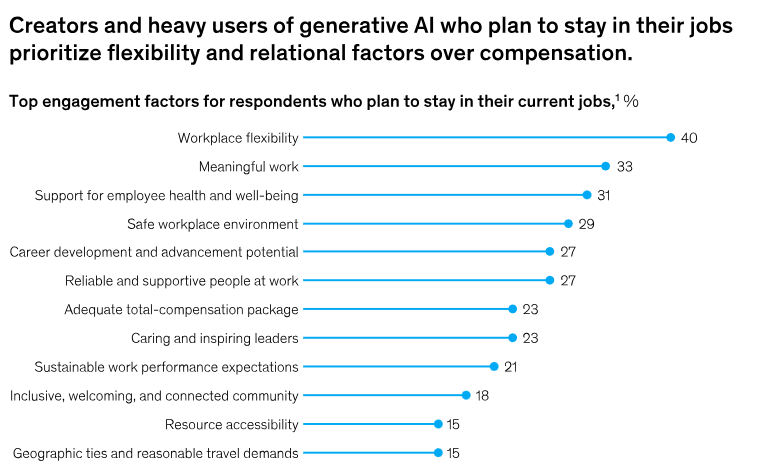I recently wrote about AI’s use in the newsroom, zeroing in on some of the more mundane tasks it’s currently doing for publishers while at the same time hopeful for how this (and any technology, really) might benefit journalism and its needs in the future.
Around the same time, McKinsey released some of its recent findings on generative AI in the larger workplace setting. Titled “The Human Side of Generative AI: Creating A Path To Productivity,” the article attempts to answer whether businesses can ultimately take advantage of employees’ newfound freedom from automatable tasks to “improve workforce engagement, retention, and attraction.”
Perhaps the biggest takeaway was that more than half (51%) of those surveyed who use the technology heavily and identify their roles as generative AI creators said they plan on quitting in the next 3 to 6 months.
“This is sobering news for those executive respondents in the survey who say they want to build gen AI talent in-house,” write the McKinsey authors. “It’s hard to reskill and upskill people when they are looking to leave.”
The survey found that those heavy-using AI creators were an “in-demand employee group … [that] strongly emphasizes flexibility and relational factors such as meaningful work, caring leaders, and health and well-being over pay.” Additionally, they feel they need higher-level cognitive and social-emotional skills more than tech skills to do their work.

(Source: McKinsey)
“As workers increasingly use gen AI to tackle more repetitive tasks, the human-centric skills of critical thinking and decision making will become ever more important,” the article says, pointing to its own analysis that high disengagement and dissatisfaction among employees can cost companies millions a year.
McKinsey suggests talking with employees about the well-defined tasks people (and gen AI) will do, looking at results-achieved more than hours-spent as a worker outcome, and defining how managers should manage both people and AI. “Technological skills such as coding will be the baseline for many jobs, but social-emotional skills and higher cognitive skills will be the differentiators for creative, collaborative work in the future,” the article says. “Perhaps this means more in-office meetings or other ways for people to engage in the most productive ways they can.”
SEE FOR YOURSELF
The Magazine Manager is a web-based CRM solution designed to help digital and print publishers manage sales, production, and marketing in a centralized platform.





